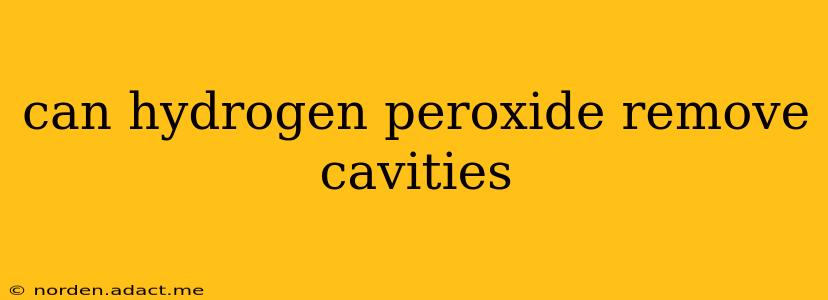The short answer is no, hydrogen peroxide cannot remove cavities. While hydrogen peroxide possesses antiseptic and bleaching properties, making it useful for various purposes, it lacks the ability to repair or reverse the damage caused by tooth decay. Cavities, or dental caries, are essentially holes in the tooth enamel caused by acid produced by bacteria feeding on sugar and food particles. This acid eats away at the enamel, creating a cavity that requires professional intervention.
Let's explore this topic further by addressing some common questions surrounding hydrogen peroxide and its use in dental care:
Can Hydrogen Peroxide Help with Tooth Decay?
While hydrogen peroxide isn't a cavity cure, its antimicrobial properties can help prevent further decay. The oxygen released by hydrogen peroxide can kill some bacteria in the mouth, thus reducing the acid production that contributes to cavities. However, this is a temporary measure and should not be considered a replacement for proper oral hygiene practices, like brushing and flossing, or regular dental checkups. Hydrogen peroxide's role is best seen as a supplementary aid, not a primary treatment.
Is Hydrogen Peroxide Safe for Teeth?
Using hydrogen peroxide directly on teeth can be damaging if not done correctly. While diluted hydrogen peroxide solutions are often used as a mouth rinse (always follow the instructions on the product packaging!), prolonged or concentrated use can irritate gums, cause sensitivity, and even damage tooth enamel over time. It's crucial to use only a diluted solution and never to swallow it.
What are the Best Ways to Prevent Cavities?
The most effective way to prevent cavities is through diligent oral hygiene and regular dental checkups. This includes:
- Brushing: Brush your teeth twice daily with fluoride toothpaste for at least two minutes each time.
- Flossing: Floss daily to remove food particles and plaque from between your teeth, where your toothbrush can't reach.
- Dental Checkups: Regular visits to your dentist allow for early detection and treatment of cavities, preventing more extensive damage.
- Healthy Diet: Limiting sugary and acidic foods and drinks reduces the bacteria's food source and minimizes acid production.
Can I Use Hydrogen Peroxide to Whiten My Teeth?
Hydrogen peroxide is a common ingredient in many teeth whitening products. However, it’s crucial to understand that using these products incorrectly can damage your enamel. Over-the-counter whitening products usually contain low concentrations of hydrogen peroxide, but it's vital to follow the instructions carefully. Professional teeth whitening treatments by a dentist provide a safer and more controlled method.
What Should I Do If I Think I Have a Cavity?
If you suspect you have a cavity, the best course of action is to schedule an appointment with your dentist. They can diagnose the cavity and recommend appropriate treatment, which might include fillings, crowns, or other restorative procedures. Delaying treatment can lead to more severe problems, such as infection or the need for more extensive dental work.
Is Hydrogen Peroxide a Substitute for Professional Dental Care?
Absolutely not. Hydrogen peroxide, even when used properly, is not a substitute for professional dental care. It can play a supporting role in maintaining oral hygiene, but it cannot repair or treat cavities. Regular checkups and professional cleanings are vital for maintaining good oral health.
In conclusion, while hydrogen peroxide has some antimicrobial properties that might indirectly help reduce bacterial growth contributing to cavities, it's not a cure for cavities and should never be considered a replacement for proper dental care. Maintain good oral hygiene practices and consult your dentist regularly for optimal dental health.
